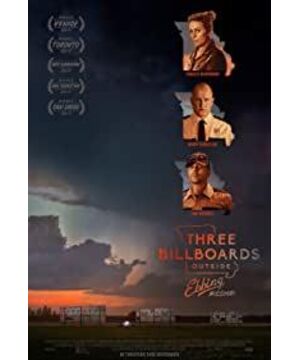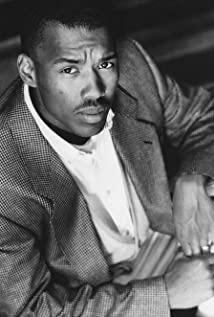This time, Martin MacDonald, disguised as a realist director, decorates the entire film with somber tones and oppressive plot that, by the end, audiences even begin to think that he has really revealed some social problem. But in fact, he has never been the kind of writer who is obsessed with reality. From writing stage plays in his early years, he later became a director and directed "In Bruges" and "Seven Neuropathies". The focus of his writing always revolved around Violent and absurd. Violence and absurdity have nothing to do with society, and actually have nothing to do with people's hearts. They are more helpless like fate. This style was also brought into "Three Billboards" by him. From the occurrence of conflicts to the various responses of the characters, the "craftsmanship" belonging to dramatic art can be seen everywhere: In limited circumstances, polishing the plot to perfection and turning a blind eye to the possibility of their occurrence in the real world. In fact, even if the first half of the movie has parts that make people feel real, when the terminally ill sheriff puts on a hood and shoots himself in the head, all that realism is completely wiped out. The rest is a performance that belongs entirely to the characters. With the permission of the script, they can go a little bit against common sense and show the truest face of human beings. This is totally understandable, after all, art allows exaggeration. It is worth mentioning that Martin Macdonald is not led by the characters with strong temperament (this is often a common problem of authors when the character setting is too realistic), but resists the temptation and controls the situation from beginning to end. . This is especially evident in Woody Harrelson's Sheriff. Throughout the film, the sheriff is not so much a character involved in the plot as it is an instrumental character. The "instrumentality" here refers to the high maturity of the character's mind and personality. Even if he is terminally ill and is blamed by the victim's mother for putting up a billboard, he still manages everything in the time and space that are stretched thin. The audience can deeply realize that this slightly old man is completely worthy of the love of the whole town. The so-called "like Zhuge is wise and close to the demon", the sheriff in the film is not so much Zhuge Liang, but more like Guo Jia, who planned to settle Liaodong. The sheriff left three letters before his death, but in fact, only the one to his wife is the real letter, and the remaining two are tips, based on the premise of his own death. He passed away in an almost almighty attitude, leaving behind a complete set of countermeasures. What's more, in order to comfort Mildred's heart and stop the mouths of the town people, he prepaid billboards for next month's cost. So, the finishing touch of the whole film The pen is not actually a mismatch of the DNA test at the end, no, any experienced screenwriter should think of such an ending, because only in this way can the temperament of the whole film be unified. The real finishing touch is that Mildred threw the Molotov cocktail into the police station where Dixon was, even though the sheriff had prepared a suicide note that was enough to quell the anger of the two. It is as if Cao Cao, who had a legacy, failed to conquer Liaodong in the end, as if Sima Yi, who was rushing to chase the Shu army, and the puppet with the face of Zhuge Liang went astray with each other: leading everything to more violence. And as more violence took place, the plot showed its power again: Mildred and Dixon were freed from suspicion of their respective arson attacks, even if it felt a little too easy. You don’t have to struggle with this repeatedly. If you have to use an analogy, it’s as if people don’t have to keep Newton’s three laws in their minds all the time when watching Japanese anime. Overly negligent police and unrealistic movements are not the subject of their respective works. This is a convenient way to make the plot easier to go on. It's not the first time that Martin Macdonald has done this. I still remember the ending of his last movie "Seven Neuropathies", where Dixion was played in this film. Sam Rockwell was shot in the brain, and when he was lying on the ground, he still had the remaining strength to let the poodle in front of him stretch out his paws for him. The exoneration of the two is naturally to serve the ending. After the audience watched the grand performance for more than an hour, the long-awaited mutual understanding finally arrived. In fact, had it not been for the sheriff's wife's delay in delivering the letter to Mildred and Dixon, forgiveness would have come forty minutes earlier. Dixon and Mildred sat in the car and drove all the way to their destination. They start to hesitate in the car about actually killing the perpetrator of a rape, and then the movie ends, with an open ending. Many thought that after so much, maybe it was time for these two exhausted people to embrace peace and love. I can't help but think of Dixon's actions after learning of the Sheriff's death: he said glorious words in a crying tone, "The only way to remember him is to go outside and be a good cop", accompanied by In the long shot of the narration, Dixon walks up to the ad agency opposite and throws the manager from the second floor. I can't help but also start to worry about whether such a "face-slapping" type of plot will be staged at the end, with love and peace in my heart, but violent acts in my hands. If this is the case, then there may be another series of equally absurd and blood-filled plot. In this way, maybe the open ending is just a message left by the author to the audience: the next story will be as exciting as the previous story, but the movie is only 120 minutes long, just like Fermat's proof, "The blank of the book. Not enough." If so, it would be a Dostoevsky story: all the characters have not fulfilled their destiny, but their destiny is already something that should be considered in another novel.
View more about Three Billboards Outside Ebbing, Missouri reviews











